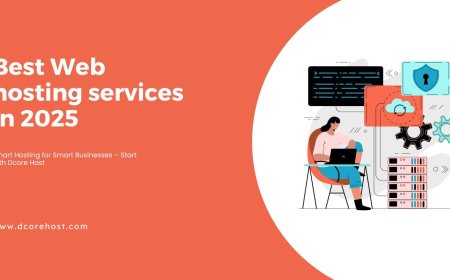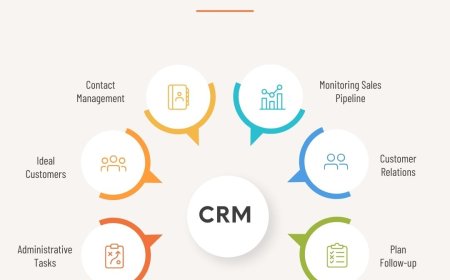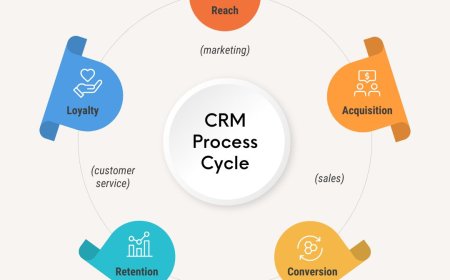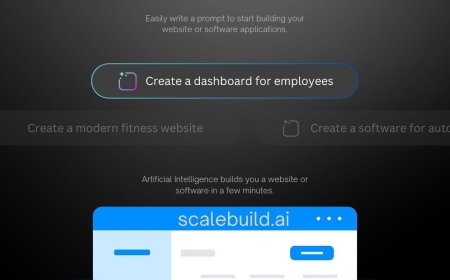How CloudOps Services Improve Cloud Performance and Reliability?
Discover how CloudOps services improve cloud performance and reliability by automating management, optimizing resources, ensuring uptime, and reducing costs.

In today's digital-first world, cloud technology has become the backbone of modern business operations. From startups to large enterprises, everyone is relying on the cloud to power applications, store data, and manage workflows. But simply moving to the cloud isnt enough. To get the most out of your cloud investment, your infrastructure needs to run smoothly, stay secure, and scale efficiently. Thats where CloudOps services step in.
CloudOpsshort for Cloud Operationsis the set of practices, tools, and processes used to manage and optimize cloud environments. Its about keeping your cloud-based systems running efficiently, reliably, and cost-effectively. Whether it's ensuring high availability, improving performance, or automating routine tasks, CloudOps services play a key role in day-to-day cloud management.
In this blog, well explore how CloudOps services can improve the performance and reliability of your cloud infrastructure, and why they are essential for businesses looking to maximize their cloud potential in 2025 and beyond.
What Are CloudOps Services?
Understanding the Basics of CloudOps
CloudOps is the operational aspect of cloud computing. It combines principles from DevOps, system administration, and IT operations to manage cloud infrastructure and applications. Unlike traditional IT operations, CloudOps is built for dynamic, scalable, and distributed environments. It includes tasks such as monitoring, automation, incident response, cost optimization, and performance tuning.
CloudOps services are offered by professionals or service providers who help organizations keep their cloud environments healthy and efficient. These services ensure your cloud systems are always available, secure, and running at optimal speed.
Key Responsibilities of CloudOps Teams
- Monitoring and alerting
- Automation of deployment and scaling
- Performance management
- Backup and disaster recovery
- Cost control and resource optimization
- Security and compliance enforcement
The ultimate goal is to maintain high performance, reliability, and business continuity, without manual intervention or downtime.
Importance of Performance and Reliability in Cloud Environments
Why Performance Matters
Performance in the cloud refers to how fast and efficiently your applications and services run. Poor performance leads to slow loading times, application crashes, or unresponsive servicesnone of which are acceptable in todays competitive market. Users expect smooth, fast digital experiences, and businesses that cant deliver them risk losing customers.
Why Reliability Is Critical
Reliability means your services are consistently available when users need them. This includes uptime, quick recovery from failures, and minimal service disruptions. Without reliability, businesses face service outages, revenue loss, and damaged reputations.
CloudOps services focus on both these aspects to ensure your business can deliver a seamless experience around the clock.
How CloudOps Services Improve Cloud Performance
Continuous Monitoring and Real-Time Alerts
CloudOps teams set up monitoring tools that track the health and performance of your cloud infrastructure 24/7. These tools provide insights into CPU usage, memory consumption, network traffic, and response times. Real-time alerts notify your team when something goes wrong, allowing quick action before it becomes a serious problem.
Load Balancing and Traffic Management
One of the ways CloudOps improves performance is through load balancing. This technique distributes incoming traffic evenly across multiple servers, preventing any one server from getting overloaded. It helps maintain consistent response times and keeps services running smoothly even during high traffic.
Auto-Scaling Resources
CloudOps services implement auto-scaling policies that automatically increase or decrease resources based on demand. For example, during peak traffic, your system automatically adds more server instances. When traffic decreases, it scales down to save costs. This ensures you always have the right resources available to handle workload without affecting performance.
Performance Tuning and Optimization
CloudOps professionals continuously analyze system performance and fine-tune configurations. They optimize database queries, adjust caching strategies, and reduce latency by deploying content closer to users through content delivery networks (CDNs). All these efforts combine to deliver a faster and more responsive system.
How CloudOps Services Enhance Cloud Reliability
High Availability Architecture
CloudOps services help design and manage systems that are highly available. This means setting up infrastructure in a way that avoids single points of failure. Redundancy, clustering, and failover strategies are used so that if one component fails, another takes over automatically.
Automated Backups and Disaster Recovery
CloudOps teams implement automated backup solutions to ensure data is always protected. In case of a failure, disaster recovery plans are executed to restore services quickly. This not only protects critical data but also ensures business continuity.
Proactive Incident Management
When issues arise, time is critical. CloudOps professionals follow structured incident management practices to identify, isolate, and fix problems quickly. They maintain runbooks and response protocols to reduce resolution time and minimize impact.
Regular Security Updates and Patch Management
Keeping systems secure is key to reliability. CloudOps teams apply regular updates, security patches, and vulnerability scans to protect against threats. They also manage identity access, firewall rules, and encryption settings to safeguard cloud environments.
Automation in CloudOps: A Game Changer
Eliminating Manual Errors
Manual configurations often lead to mistakes. Automation reduces human error by using scripts and tools to handle repetitive tasks like deployments, backups, and scaling.
Faster Deployment and Updates
With automation, new features, patches, and updates can be deployed quickly and consistently across environments. This reduces downtime and improves reliability without requiring lengthy maintenance windows.
Infrastructure as Code (IaC)
CloudOps teams use Infrastructure as Code to define and manage infrastructure using code files. This makes deployments faster, more consistent, and easier to reproduce. It also supports version control and collaboration between teams.
Read more: Boost Your IT Efficiency with Professional DevOps Consulting Services
Cost Efficiency with CloudOps Services
Identifying Unused Resources
CloudOps services include cost optimization, where teams regularly audit your cloud environment to identify underutilized or idle resources. Shutting these down saves money and improves efficiency.
Rightsizing Resources
They analyze workloads and recommend the right size of virtual machines or containers needed to run your applications efficiently. This avoids both overprovisioning and underprovisioning.
Optimizing Storage
CloudOps teams manage storage tiers and retention policies to ensure youre using the right type of storage for different workloads. This balances performance and cost effectively.
Real-World Scenarios Where CloudOps Made the Difference
Example 1: E-Commerce Website
An online retailer faced slow load times during flash sales. CloudOps experts implemented auto-scaling and load balancing, resulting in a 50% improvement in response time and zero downtime during high-traffic events.
Example 2: SaaS Application
A software company was experiencing frequent crashes due to poor infrastructure planning. CloudOps consultants restructured the environment for high availability and implemented proactive monitoring, reducing incidents by 70%.
Example 3: Healthcare Provider
A healthcare platform needed strict data security and availability. CloudOps services provided automated backups, encryption, and HIPAA-compliant monitoring systems. They ensured 99.99% uptime and full data protection.
Choosing the Right CloudOps Partner
Look for Experience and Certifications
Choose a partner with a proven track record in cloud operations and relevant certifications from providers like AWS, Azure, or Google Cloud.
Ensure Round-the-Clock Support
CloudOps is not a 9-to-5 job. Ensure your provider offers 24/7 monitoring and support to deal with emergencies whenever they arise.
Transparency and Communication
You should receive regular reports and updates about your systems health, costs, and areas for improvement. Good communication ensures alignment and trust.
Conclusion
Cloud computing is essential to running a modern business, but maintaining performance and reliability in the cloud is not as simple as flipping a switch. Thats why CloudOps services are so important. They bring structure, automation, and proactive management to your cloud infrastructure, ensuring it runs smoothly, securely, and cost-effectively.
From real-time monitoring and load balancing to automated backups and disaster recovery, CloudOps teams take care of the operational side of your cloud so that your business can focus on growth and innovation. With the increasing reliance on digital platforms and customer expectations at an all-time high, investing in CloudOps is not just a technical decisionits a strategic one.
Partnering with a professional app development company that also offers CloudOps services can help you build, deploy, and manage cloud-based applications that are scalable, secure, and high-performing. In 2025 and beyond, this combination of smart development and smart operations will be the key to long-term success.
FAQs
What is the difference between DevOps and CloudOps?
DevOps focuses on software development and delivery, while CloudOps deals with managing and optimizing cloud infrastructure. Both work together but handle different responsibilities.
How does CloudOps help with cost optimization?
CloudOps teams regularly audit your cloud usage, remove unused resources, and rightsize infrastructure to ensure you're not overspending.
Can CloudOps services support multiple cloud providers?
Yes, most CloudOps services are designed to work across multiple cloud environments like AWS, Azure, and Google Cloud, supporting hybrid or multi-cloud strategies.
Is CloudOps only needed for large businesses?
No, businesses of all sizes can benefit. Even startups and small teams use CloudOps services to keep their applications reliable and costs under control.
How quickly can CloudOps teams respond to outages?
CloudOps teams typically have 24/7 monitoring in place and follow structured incident response plans to act immediately and resolve issues before they affect end users.

























































